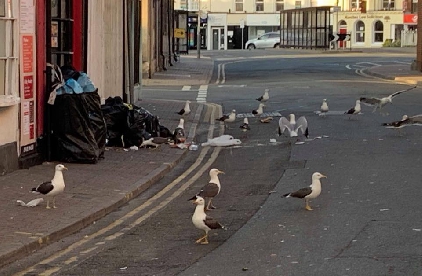
A comprehensive action plan to reduce the numbers of gulls nesting in Worcester next year is to be considered by councillors, including boosting spending by £40,000.
The creation of three gull nest exclusion zones, subsidising property owners to make their buildings “gull-proof” and campaigning for a change to the national rules that limit what can be done to control the birds are among the actions to be considered by the City Council’s Environment Committee.
The numbers of breeding gulls in the city have caused problems for Worcester residents and businesses, with the birds swooping down on people, calling out noisily early in the morning, interrupting sleep, and depositing large amounts of mess on pavements, buildings and unlucky passers-by.
Councillor Andy Stafford, Chair of Worcester City Council’s Environment Committee, said: “There are only a few gulls left in the city at this time of year, but everyone in the city knows that when they return in the spring for the nesting season they once again become both a pest and, in some cases, a direct threat to public health and safety.
“Earlier this year we doubled the budget to tackle the problems they cause to £60,000 and now is the time when we have to start planning for their return, so that we make sure there are fewer breeding pairs in 2022.”
The new action plan includes the idea of creating three experimental gull nest exclusion zones in The Tything, at Weir Lane / Lower Wick and around Fish St and Copenhagen St in the city centre.
The idea is to ensure there are no nesting gulls whatsoever in these zones, with a range of actions being taken to achieve this – including installing spikes, netting, and wire-mesh cages at popular nesting spots, plus activities that will disturb the birds including human presence at the sites, tapping roofs, shining lights, and the playing of recordings of gulls’ distress calls. This scheme would be dependent on businesses and residents in the three areas being prepared to work with the Council.
Other proposals in the new action plan include:
- Subsidising the installation of gull-proof cages on the roofs of 28 buildings across the city
- Continuing to remove gulls’ nests, eggs and even chicks when a legitimate health and safety threat can be demonstrated, and a licence obtained from Natural England
- Expanding the number of areas in the city where hawks are flown to deter the gulls. Hawks would be flown five days a week from February to May next year
- Developing planning rules to “design out” potential nesting sites in new buildings, and introduce more physical barriers to gulls being able to fly in the city centre, including trees and canopies at shop entrances
- Further encouraging of businesses and customers to make sure waste food is disposed of properly, to avoid giving the gulls a free meal
- Lobbying Natural England to loosen some of the restrictions on actions that can be taken to deter gulls, whilst still respecting their status as protected species
- Sharing data and experiences with other cities that have a strong gull presence to identify best practice.
To deliver these actions, the Environment Committee will be asked to support a further £40,000 increase in the gull control budget, with the 2022 plan estimated to cost £74,500.
The 2022 action plan would build on the successful work to control the birds’ population this year, which has included the licenced removal of 141 nests and 223 eggs, the “rescue” of 29 chicks (which were rehabilitated and released into the wild at coastal locations), the installation of gull-proof measures at 13 properties around the city, the use of a giant cherry-picker to remove nesting materials from the tops of buildings (after the nesting season had ended), the regular flying of hawks, and painting the roof of a building red to test the theory that it will deter the birds.


 Investigation launched after two deaths in Redditch
Investigation launched after two deaths in Redditch

